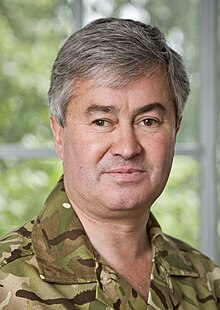Sir Richard Barrons | |
|---|---|
 | |
| Born | 17 May 1959 Northampton, Northamptonshire, England |
| Allegiance | United Kingdom |
| Service | British Army |
| Years of service | 1977–2016 |
| Rank | General |
| Service number | 504825 |
| Unit | Royal Artillery |
| Commands | Joint Forces Command Deputy Commanding General, Multi-National Corps – Iraq 39th Infantry Brigade 3rd Regiment Royal Horse Artillery |
| Battles / wars | The Troubles Kosovo War Iraq War War in Afghanistan |
| Awards | Knight Commander of the Order of the Bath Commander of the Order of the British Empire Queen's Commendation for Valuable Service (2) Officer of the Legion of Merit (United States) |
| Other work | Author, guest speaker Chairman of the Royal Artillery Museum |
General Sir Richard Lawson Barrons, KCB, CBE (born 17 May 1959)[1][2] is a retired British Army officer. He was Commander Joint Forces Command from April 2013 until his retirement in April 2016.
Barrons' early career was spent in various staff and field posts in the UK, across Europe, and in the Far East. He also spent time working at the Ministry of Defence and in education. Sent to Germany in 1991, Barrons then served his first tour of duty in the Balkans in 1993. Returning to the UK, Barrons took up a staff position and went on to do a tour in Northern Ireland and then to become a Military Assistant, first to the High Representative for Bosnia and Herzegovina and then to the Chief of the General Staff. Between 2000 and 2003, Barrons served again in the Balkans, in Afghanistan during the early days of International Security Assistance Force, and then in a staff position in Basra, Iraq.
As a brigadier in 2003, Barrons served his second tour in Northern Ireland, this time as a brigade commander. In 2005, he was appointed to Assistant Chief of Staff, Commitments, a senior staff position. He was promoted to major general in 2008 and deployed to Iraq for the second time, this time to Baghdad, with responsibility for joint operations. He then served briefly with the NATO Allied Rapid Reaction Corps before being sent to Afghanistan for the second time, when he headed an ISAF reintegration unit to provide incentives for Taliban soldiers to surrender. He later became Deputy Chief of the Defence Staff (Operations).
- ^ "Index entry". FreeBMD. ONS. Retrieved 26 October 2016.
- ^ "No. 47364". The London Gazette (Supplement). 31 October 1977. p. 13729.